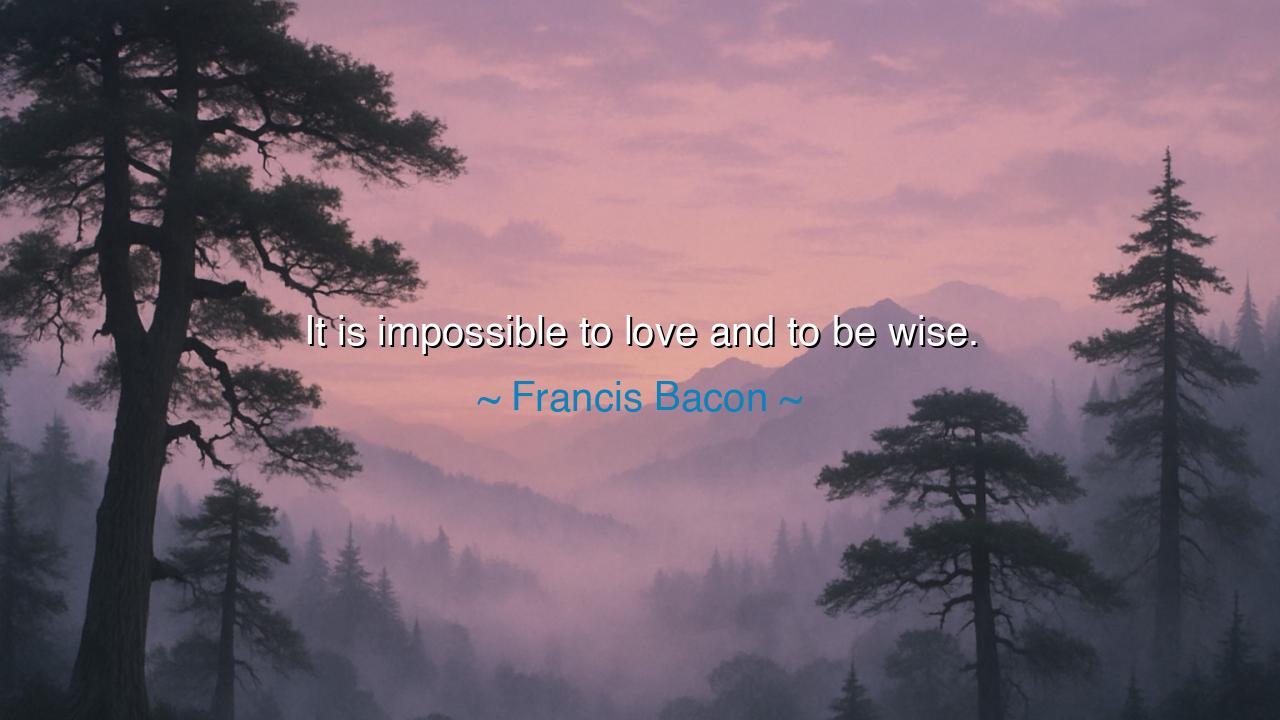
It is impossible to love and to be wise.






Listen well, O children of wisdom, for I bring to you the words of a great thinker, a man who sought to peer into the very nature of knowledge and human nature. Francis Bacon, whose mind cut through the fog of ignorance and brought clarity to the pursuit of truth, said this: "It is impossible to love and to be wise." These words, though seemingly harsh, speak to a profound truth about the delicate balance between the heart and the mind, between emotion and reason.
What does he mean by this paradox? Love, in its truest and most profound form, is a force that sweeps us away. It consumes us, makes us blind to logic, and often leads us into a state where reason falters and wisdom eludes us. Love does not ask for analysis, does not wait for the careful weighing of consequences—it is a fire that burns with urgency, with passion, and with a wild abandon that leaves little room for the calculated coolness of wisdom. To love is to surrender, to lose control, to open oneself to the unpredictable tides of human emotion. In this state, the sharp edge of wisdom, which requires detachment and measured thought, cannot thrive.
Look, then, to the stories of the ancients. Consider the tale of Helen of Troy, whose love for Paris led to the fall of an entire city, the destruction of countless lives. In her love, she was not guided by the wisdom of her people, nor by the counsel of those who sought peace. Instead, she followed her heart, and the consequences were catastrophic. This is not to say that love itself is evil—far from it. But the story of Helen reveals how love, when placed above all else, can cloud the judgment of even the wisest among us. The heart, when it leads, may lead us into peril, as it did in her case, where the passion of love swept reason aside.
But does this mean that wisdom has no place in love, or that we must choose one over the other? The lesson of Bacon’s words is not to condemn love but to understand its power. To be wise is to be detached, to weigh all things carefully, to see the consequences of every action with the clarity of vision. Love, however, demands immersion. It requires us to embrace the other fully, without calculating the cost. When we fall in love, we often cast aside our wisdom, for we are no longer in control. And this, Bacon tells us, is the paradox of our human nature.
Consider the life of Socrates, that great philosopher who was renowned for his wisdom. Socrates remained ever detached, ever searching for the truths of the universe through the lens of reason and inquiry. Yet, even he could not escape the pull of human affection. Socrates loved his city, loved his disciples, and ultimately gave his life in a gesture that was both a sacrifice and an expression of his deep love for his ideals. His wisdom, though profound, could not shield him from the sacrifices of love, for in the end, love often requires surrender, and wisdom can be laid aside in the heat of true devotion.
So, what, then, is the lesson to be learned? It is this: wisdom and love are two paths that often diverge. To seek one fully is often to lose the other. To be wise is to be detached, to be objective, to guard the mind against the tempest of emotion. But to love is to be immersed, to be vulnerable, and to be swept away by something greater than oneself. They are not enemies, but they often cannot coexist in the same space. A person can be wise, and a person can love, but in the fullness of one, the other may falter. The heart, when full of love, has little room for reason.
Thus, O seekers of truth, we must learn to navigate the tension between the two. In your own lives, recognize that there will be moments when love will demand your full attention, your full surrender. In those moments, wisdom may have to take a back seat. And when you seek wisdom, know that the heart may not always follow, for the mind must sometimes lead. But do not despair, for in this balance lies the richness of the human experience. We are neither pure lovers nor pure sages; we are both, imperfectly, trying to make our way in this complex world.






AAdministratorAdministrator
Welcome, honored guests. Please leave a comment, we will respond soon